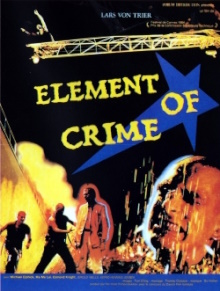This time we’re going all the way back to the very first feature film by Lars von Trier. I may not enjoy every one of Trier’s films but I can’t deny that they’re each so unique. The concept of a detective who dives so deep into the mind of the serial killer he is hunting that he becomes lost isn’t novel by now and I’m even getting some Max Payne vibes from the main character. The execution and aesthetics are something else however with practically every shot being shocking or just plain weird. Plus it even offers a justification for the world seeming to be the way it is! I wouldn’t read too much into what it means but it is rather satisfying to watch.
A detective named Fisher lives in Cairo and recounts his last case that took place in Europe under the effects of hypnosis. He has been summoned by his mentor Osbourne to catch a serial killer who strangles and mutilates young girls selling Lotto tickets. Osbourne teaches a particular method to pursue criminals that he has published in a book called ‘The Element of Crime’. This seems to involve adopting the criminal’s mindset to identify the criminal. The police already have a suspect named Harry Grey and possess a detailed report of his activities due to suspecting him of subversive activities. Fisher hunts for Harry Grey using his mentor’s methods, meeting the coroner to learn how he uniquely marks his victims, checking into the hotels he stayed in and finding how the murders fit a particular pattern. The trail eventually leads him to a brothel where he meets a prostitute named Kim who also had Harry as a client. Fisher doesn’t hesitate to have sex with her as well and even takes the medication that Harry left behind though it gives him intense headaches, all as part of the effort to understand what makes Harry tick.
As you’re already told from the opening of the film Fisher is insane and has to undergo hypnosis, so it’s not difficult to predict where the attempt to know the mind of a serial killer is headed. The scenario is absurd in any case as the police already have an astonishing amount of information about the murderer including exactly where he has been so it’s questionable what else they need to know to catch him. So the film is not about Harry at all but about how Fisher becomes increasingly crazier as he transforms into Harry. Unsurprisingly Osbourne is just as crazy as Fisher himself as is almost everyone else. Amusingly enough most of the other police officers, including the chief Kramer, are completely justified in treating both Fisher and Osbourne as total cuckoos. This is absolutely ridiculous and unsatisfying as any kind of investigative film so it’s understandable why it polarized critics as the time of its release. Yet, visually it’s so unique and so shocking that it can’t help but stand out, making it watching it a sensory experience like so other.
Every frame of this film looks striking. It replicates the look and feel of a noir by having very monochrome color palette, yet instead of being black and white, it uses sodium lights to achieve a very yellowish look. Water is everywhere, constantly drenching every scene. It’s not just the pouring rain and the damp tunnels, even the police archives in the basement is inexplicably inundated with water and Fisher has to literally descend on a rope to look through the records. The world doesn’t make sense as Fisher seems to exist in perpetual night and even the seasons are wrong as a housekeeper notes. The dreamlike quality is explained by all this not being the literal truth but instead Fisher’s own disordered recollections as recounted under hypnosis. It’s fantastic but it’s very explicitly meant to evoke only that specific aesthetic and a sense of disquiet without trying to say anything in particular.
One element that I haven’t quite grasped is that Trier seems to use the word ‘Europe’ in some special manner. It’s not nothing that this is considered in the first part of the so-called Europa trilogy. Here, Fisher considers Cairo his home while Europe is a decaying dystopia. It’s obviously a response to some trauma, but of what specifically I’m not sure. Anyway I like this more than many of Trier’s other films and I will certainly continue to work my way through the rest of his oeuvre.
